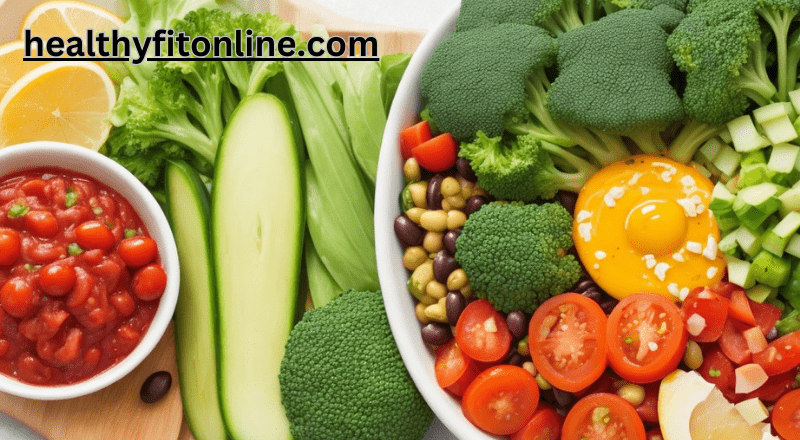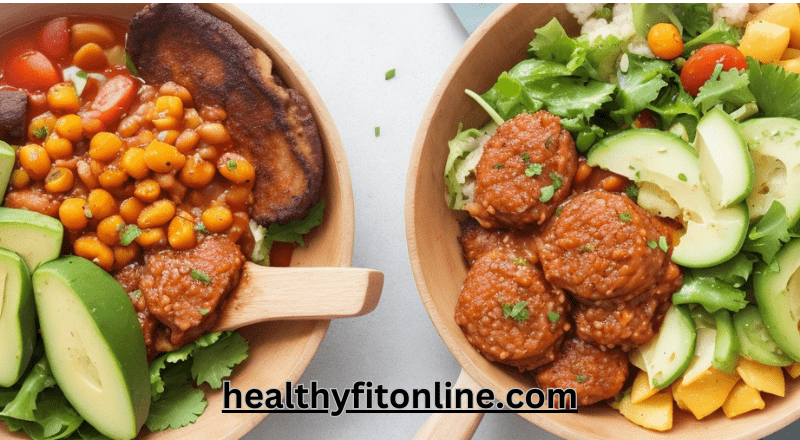Vegan and vegetarian diets have gained immense popularity in recent years. Many individuals are making the switch to plant-based eating for various reasons, including health, ethical concerns, and environmental impact.
- Introduction
- The Basics of Vegan and Vegetarian Diets
- Health Benefits of Vegan and Vegetarian Diets
- Essential Nutrients in Vegan and Vegetarian Diets
- Meal Planning and Preparation
- Staying Committed to a Plant-Based Lifestyle
- Sustainability and Environmental Impact

- Vegan and Vegetarian Options When Dining Out
- The Psychological Aspect
- Vegan and Vegetarian Diet for Weight Loss
- Vegan and Vegetarian Diet for Athletes
- Common Misconceptions
- Cooking and Recipe Resources
- Conclusion
- Introduction
- The Basics of Vegan and Vegetarian Diets
- Health Benefits of Vegan and Vegetarian Diets
- Essential Nutrients in Vegan and Vegetarian Diets
- Meal Planning and Preparation
- Staying Committed to a Plant-Based Lifestyle
- Sustainability and Environmental Impact
- Vegan and Vegetarian Options When Dining Out
- The Psychological Aspect
- Vegan and Vegetarian Diet for Weight Loss
- Vegan and Vegetarian Diet for Athletes
Introduction
- Briefly introduce the topic of vegan and vegetarian diets.
- Mention the growing popularity of these diets and the reasons behind it.
The Basics of Vegan and Vegetarian Diets
- Explain what vegan and vegetarian diets entail.
- Highlight the key differences between the two.
- Discuss the importance of plant-based foods.
Health Benefits of Vegan and Vegetarian Diets
- Explore the various health advantages associated with these diets.
- Discuss improved heart health, weight management, and lower risk of chronic diseases.
Essential Nutrients in Vegan and Vegetarian Diets
- Emphasize the need for careful nutrient planning.
- Discuss sources of protein, iron, calcium, and vitamin B12 in plant-based diets.
Meal Planning and Preparation
- Offer guidance on crafting well-balanced meals.
- Offer advice on ingredient substitutions in vegan and vegetarian recipes.
Staying Committed to a Plant-Based Lifestyle
- Discuss the challenges of maintaining a vegan or vegetarian diet.
- Offer strategies for staying motivated and dedicated.
Sustainability and Environmental Impact
- Highlight the positive effects of vegan and vegetarian diets on the environment.
- Discuss the reduction of carbon footprint and resource conservation.
Vegan and Vegetarian Options When Dining Out
- Advise on how to navigate restaurant menus as a vegan or vegetarian.
- Sharing the tips for traveling while maintaining a plant-based diet.
The Psychological Aspect
- Address the mindset and attitude needed for long-term success.
- Discuss the psychological benefits of these diets.
Vegan and Vegetarian Diet for Weight Loss
- Explore the potential for weight loss through plant-based eating.
- Provide tips for achieving and maintaining a healthy weight.
Vegan and Vegetarian Diet for Athletes
- Explain how athletes can thrive on plant-based diets.
- Share examples of successful vegan and vegetarian athletes.
Common Misconceptions
- Debunk some common myths and misconceptions about vegan and vegetarian diets.
- Clarify concerns regarding protein intake and nutrient deficiencies.
Cooking and Recipe Resources
- Suggest useful cookbooks, websites, and apps for vegan and vegetarian recipes.
- Share popular recipes that are easy to prepare.
Conclusion
- Summarize the key points discussed in the article.
- Reinforce the benefits of vegan and vegetarian diets for a healthy lifestyle.
Introduction
Vegan and vegetarian diets have gained immense popularity in recent years. Many individuals are making the switch to plant-based eating for various reasons, including health, ethical concerns, and environmental impact. In this article we explores the world of vegan and vegetarian diets and providing the insights into how to maintain a healthy lifestyle while following these dietary choices.
The Basics of Vegan and Vegetarian Diets
What are Vegan and Vegetarian Diets?
Vegan and vegetarian diets are primarily plant-based eating patterns. Vegans abstain from all animal products, including meat, dairy, eggs, and even honey. On the other hand, vegetarians avoid meat but may consume dairy products and eggs. These diets emphasize whole foods, such as fruits, vegetables, grains, legumes, nuts, and seeds, and exclude or limit processed and animal-based foods.
Key Differences
The primary distinction between vegans and vegetarians is the inclusion of dairy and eggs in the latter’s diet. Vegans adopt a stricter plant-based approach, which necessitates more diligent attention to nutrient intake.
The Importance of Plant-Based Foods
Both vegan and vegetarian diets underscore the significance of plant-based foods. These diets are rich in vitamins, minerals, fiber, and antioxidants, which can enhance overall health. Embracing these diets can lead to improved well-being and a reduced risk of chronic diseases.
Health Benefits of Vegan and Vegetarian Diets
Vegan and vegetarian diets offer a multitude of health advantages. Some of the key benefits include:
- Heart Health: Reduced consumption of saturated fats from animal products can lower the risk of heart disease.
- Weight Management: Plant-based diets are often associated with lower calorie intake, making them conducive to weight management and weight loss.
- Lower Risk of Chronic Diseases: Studies have shown that vegans and vegetarians have a lower risk of developing conditions such as type 2 diabetes, certain types of cancer, and hypertension.
Essential Nutrients in Vegan and Vegetarian Diets
While vegan and vegetarian diets have numerous health benefits, they require careful planning to ensure adequate nutrient intake. We have some essential nutrients to focus on include:
- Protein: Sources of protein include tofu, tempeh, legumes, nuts, and seeds.
 Iron: Found in leafy greens, legumes, and fortified cereals.
Iron: Found in leafy greens, legumes, and fortified cereals.- Calcium: Obtained from fortified plant-based milk, leafy greens, and almonds.
- Vitamin B12: Typically found in animal products, so supplementation or fortified foods are necessary for vegans.
Meal Planning and Preparation
Effective meal planning is crucial for maintaining a balanced vegan or vegetarian diet. Consider the following tips:
- In the planing we include a variety of fruits and vegetables in your meals.
- Experiment with new grains, like quinoa and bulgur.
- Replace meat with plant-based proteins, such as tofu and legumes, in your favorite recipes.
Staying Committed to a Plant-Based Lifestyle
While adopting a vegan or vegetarian diet can be rewarding, it may come with challenges. Here’s how you can stay committed:
- Educate yourself about the benefits of plant-based eating.
- We need to Connect with a supportive community people of like-minded individuals.
- Keep your motivation high by setting clear goals and tracking your progress.
Sustainability and Environmental Impact
Beyond health benefits, vegan and vegetarian diets have a positive impact on the environment. By reducing meat consumption, you can significantly decrease your carbon footprint and contribute to resource conservation. Choosing plant-based foods is a sustainable choice that benefits the planet.
Vegan and Vegetarian Options When Dining Out
Eating out as a vegan or vegetarian is easier than ever. To make dining out a breeze:
- Check restaurant menus online in advance to identify plant-based options.
- When dining at non-vegetarian restaurants, inquire about customization.
- Embrace global cuisines like Mediterranean or Asian, which often have vegan-friendly choices.
The Psychological Aspect
Maintaining a vegan or vegetarian diet isn’t just about food—it’s a mindset. By adopting a positive attitude and focusing on your well-being, you can enjoy the psychological benefits of these diets, such as increased energy, mental clarity, and reduced stress.
Vegan and Vegetarian Diet for Weight Loss
If weight loss is your goal, a vegan or vegetarian diet can be a valuable tool. These diets are naturally lower in calories and saturated fats, making them conducive to weight management. Focus on whole, unprocessed foods, and combine regular exercise to achieve and maintain a healthy weight.
Vegan and Vegetarian Diet for Athletes
Contrary to the myth that athletes need a meat-heavy diet, many successful athletes follow vegan or vegetarian diets. Plant-based eating can provide ample protein and nutrients for sports performance. Notable athletes like Novak Djokovic and Serena Williams have demonstrated the benefits

